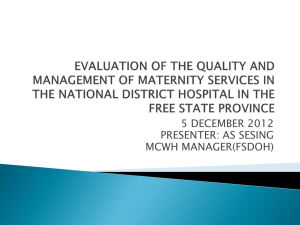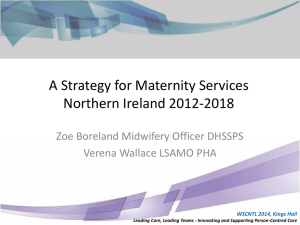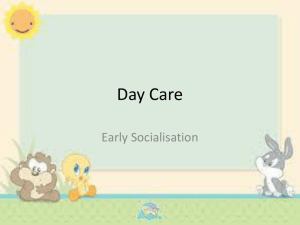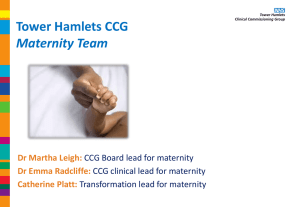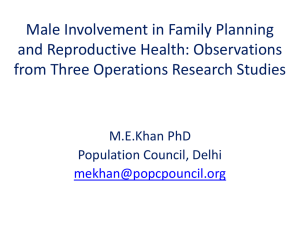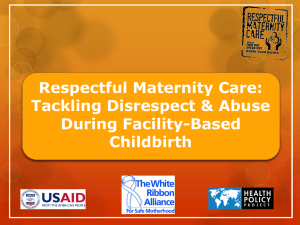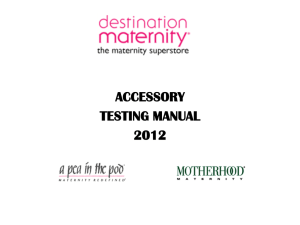2020 Vision for a High Quality, High Value Maternity Care System
advertisement
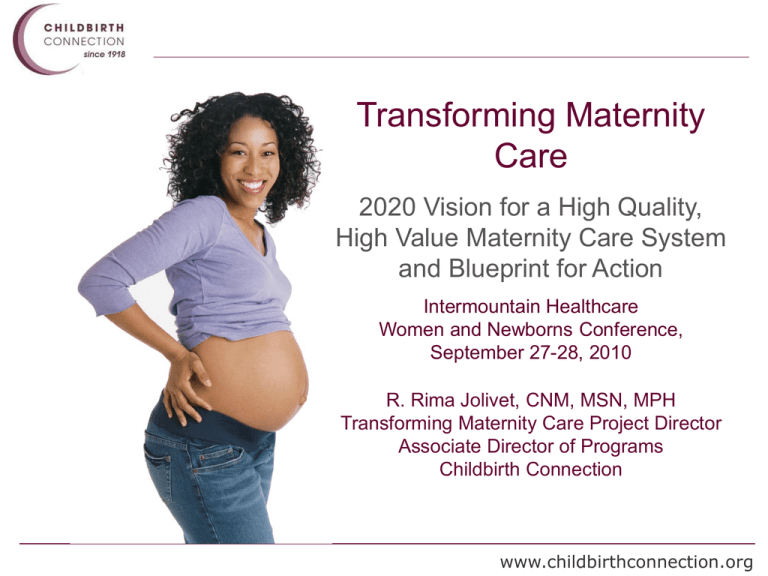
Transforming Maternity Care 2020 Vision for a High Quality, High Value Maternity Care System and Blueprint for Action Intermountain Healthcare Women and Newborns Conference, September 27-28, 2010 R. Rima Jolivet, CNM, MSN, MPH Transforming Maternity Care Project Director Associate Director of Programs Childbirth Connection www.childbirthconnection.org Childbirth Connection Mission To improve the quality of maternity care through research, education, advocacy, and policy. www.childbirthconnection.org Maternity care is a major segment of health care • 85% of women give birth • Childbirth is the number one reason for being hospitalized • 25% of those discharged from the hospital are childbearing women or newborns • Maternal and newborn charges are the runaway leader in hospital charges: $86 billion in 2006 • Childbirth accounts for 6 of the 10 most common hospital procedures • Cesarean section is the most common operating room procedure • Employers and private insurers pay for half of all births, and taxpayers and Medicaid programs pay for 42% of births References at http://www.childbirthconnection.org/article.asp?ck=10621 www.childbirthconnection.org Much of the care women receive is not consistent with the best evidence The Milbank report reveals: • A pattern of wide practice variation, unwarranted by health status or women’s preferences • Overuse of many practices that entail harm and waste for mothers, babies, and the system at large • Other effective, high-value practices that are systematically underused www.childbirthconnection.org/ebmc/ www.childbirthconnection.org Evidence-Based Maternity Care: Core Aim • Provide effective care with least harm to childbearing women and newborns • Possible care paths often have very different benefit/harm profiles • Give priority to effective paths that are least invasive, ideally with limited or no known harms Consistent with: First, Do No Harm www.childbirthconnection.org Examples of Overuse in Maternity Care • Labor induction • Epidural analgesia • Cesarean section • Continuous electronic fetal monitoring • Rupturing membranes • Episiotomy www.childbirthconnection.org Examples of Underuse in Maternity Care • • • • • • • • • • Smoking cessation interventions External version Continuous labor support Measures to bring comfort and promote labor progress Delayed and spontaneous pushing Non-supine positions for giving birth Delayed cord clamping Early skin-to-skin contact Interventions for breastfeeding initiation, duration Interventions for postpartum depression www.childbirthconnection.org Unwarranted Practice Variation • Manifold variation is common • Across regions, hospitals, caregivers • Across very narrow classes of women (Robson mode of birth categories) • 124 Hospital Corporation of America facilities: almost “random” pattern of operative delivery • Baicker and colleagues: higher rates of cesarean involve use in healthier women, with greater expense, inevitable excess morbidity, and no mortality gains www.childbirthconnection.org How Do We Reliably Deliver the Right Maternity Care at the Right Time? • “Every system is perfectly designed to get the results it gets.” --Paul Batalden • “The definition of insanity is continuing to do the same thing over and over again and expecting a different result.” --Albert Einstein The solution is to change the system in which maternity care is delivered www.childbirthconnection.org Transforming Maternity Care: Looking Forward with Shared Perspective The TMC Project: • Multi-year collaboration with more than 100 maternity care leaders • Broad participation • Open, transparent group process to reach consensus through discourse • Two direction-setting papers: “2020 Vision” and “Blueprint for Action” • Dissemination and implementation through Partnership and Community Action www.childbirthconnection.org www.childbirthconnection.org Transforming Maternity Care Steps • Vision: figure out where we want to go • Blueprint: figure out how to get there • Implementation: head off in that direction www.childbirthconnection.org 2020 Vision for a High Quality, High Value Maternity Care System www.childbirthconnection.org Transforming Maternity Care: Looking Forward with Shared Perspective What Is a Vision? www.childbirthconnection.org Transforming Maternity Care: Looking Forward with Shared Perspective • A Vision Is: • A framework for possibility • A long clear sightline radiating forward • A statement of fundamental human desires • An open invitation and an inspiration for people to create ideas and events that correlate with its definitional framework (Zander & Zander, 2000) www.childbirthconnection.org Transforming Maternity Care: Looking Forward with Shared Perspective • A Vision Provides: • A focal point for change • A clear, shared definition of the goals • Motivation to change, even when it is hard • A rallying point that brings stakeholders together in service of a perceived greater good (Kotter, 1996) www.childbirthconnection.org Transforming Maternity Care: Looking Forward with Shared Perspective 2020 Vision for a High Quality, High Value Maternity Care System • Fundamental values and principles that apply across the whole continuum of maternity care • Goals for each phase and for providers and settings for maternity care • Attributes of the larger system that can reliably provide high quality, high value care to all childbearing women, their newborns and families www.childbirthconnection.org 2020 Vision for a High Quality, High Value Maternity Care System Fundamental Values and Principles • 6 Aims, adapted from the seminal Institute of Medicine definitions of quality • Further values and principles that are foundational to the Vision www.childbirthconnection.org 2020 Vision for a High Quality, High Value Maternity Care System 6 Aims Applied to Maternity Care • • • • • • Woman-Centered Safe Effective Timely Efficient Equitable A new take on familiar definitions www.childbirthconnection.org 2020 Vision for a High Quality, High Value Maternity Care System Further Foundational Values & Principles for Maternity Care • Life-changing experience • Care processes protect, promote, and support physiologic birth • Care is evidence-based • Quality is measured, performance is disclosed www.childbirthconnection.org 2020 Vision for a High Quality, High Value Maternity Care System Further Foundational Values & Principles for Maternity Care • Care includes support for decision making and choice • Care is coordinated • Caregiver satisfaction and fulfillment is a core value www.childbirthconnection.org 2020 Vision for a High Quality, High Value Maternity Care System www.childbirthconnection.org 2020 Vision for a High Quality, High Value Maternity Care System Levels A & B: Women and their Support Networks, and Microsystems that Provide Direct Care • • • • • Care During Pregnancy Care Around the Time of Pregnancy Care After Giving Birth Key Participants Care Settings www.childbirthconnection.org 2020 Vision for a High Quality, High Value Maternity Care System Level C: Health Care Organizations Envisioning system attributes that: • • • • Strengthen the structure of the care delivery system Strengthen the maternity care workforce Foster high-quality maternity care Provide woman- and family-centered care www.childbirthconnection.org 2020 Vision for a High Quality, High Value Maternity Care System Level D: The Macro Environment of Care Envisioning system attributes that: • • • • • • Strengthen performance measurement Improve the functionality of payment systems Strengthen professional education and guidance Close priority gaps in research Improve the functioning of the liability system Enable reliable delivery of high quality maternity care www.childbirthconnection.org The Challenge of Change: • “Facts do not change feelings, and feelings are what influence behavior. The accuracy and clarity with which we absorb information has little impact on us: it is how we feel about information that determines whether we will use it.” –Vera Keane, CNM, 1967 • “Fables can be powerful because they take serious, confusing, and threatening subjects and make them clear and approachable…In our modern, high-tech world, we can easily forget this simple yet profound truth.” –John Kotter, 2005 www.childbirthconnection.org A Tale of Two Births A Fable to Illustrate the Vision www.childbirthconnection.org Fable to Illustrate the Vision • Common response: “But we are already providing maternity care that is [fill in the blank: woman-centered, high-quality, evidence-based] now.” • The fable was developed to compare a woman experiencing common elements of care within the present system and her friend who experiences care within the envisioned system • Brings to life implications of the proposed vision for women, newborns and families Available at www.childbirthconnection.org/vision/ www.childbirthconnection.org Transforming Maternity Care: Looking Forward with Shared Perspective Blueprint for Action: Steps Toward a High Quality, High Value Maternity Care System ‘‘Who needs to do what, to, for, and with whom to improve the quality of maternity care over the next five years?’’ www.childbirthconnection.org Blueprint for Action: Steps Toward a High Quality, High Value Maternity Care System • Five stakeholder workgroups developed detailed sector-specific reports • Actionable strategies in 11 critical focus areas • Synthesized into a comprehensive Blueprint for Action by the Symposium Steering Committee • Full stakeholder reports are published online at: www.childbirthconnection.org/workgroups www.childbirthconnection.org Blueprint for Action: Steps Toward a High Quality, High Value Maternity Care System 11 Critical Focus Areas: • Performance measurement and leveraging of results • Payment reform to align incentives with quality • Disparities in access and outcomes of maternity care • Improved functioning of the liability system www.childbirthconnection.org Blueprint for Action: Steps Toward a High Quality, High Value Maternity Care System 11 Critical Focus Areas: • Scope of covered services for maternity care • Coordination of maternity care across time, settings, and disciplines • Clinical controversies (home birth, VBAC, vaginal breech and twin birth, elective induction, and maternal demand cesarean section) • Decision making and consumer choice • Scope, content, and availability of health professions education • Workforce composition and distribution • Development and use of health information technology (IT) www.childbirthconnection.org Blueprint for Action: Recommendations and strategies aimed at every level of the maternity care system www.childbirthconnection.org Selected Blueprint Recommendations of Special Relevance to Maternity Care Clinicians and Delivery Systems www.childbirthconnection.org Examples: Action Steps at the Delivery System Level Performance Measurement and Leveraging of Results • Develop, test, and submit needed measures to NQF • Address critical gaps across the full episode of maternity care • Develop state or regional quality collaboratives that bring hospitals, clinicians, consumers, and payors together to test the impact of performance measures on P4P, audit and feedback, QI indicators. www.childbirthconnection.org Examples: Action Steps at the Delivery System Level Payment Reform to Align Incentives with Quality • Pilot maternity care payment reform models that restructure health system relationships and financing to align quality and value, and foster improved care coordination, including From Volume to Value model (Miller, 2008) • Conduct regional demonstration projects involving all payors and providers • Share results for learning and replication www.childbirthconnection.org Examples: Action Steps at the Delivery System Level Disparities in Access and Outcomes of Maternity Care • Form quality collaboratives and community-based partnerships to evaluate and implement programs to close disparities in maternity care outcomes. • Carry out comparative effectiveness research and apply disparities-sensitive criteria • Test effect on outcomes and cost of preventive programs that have demonstrated an impact in populations experiencing disparities www.childbirthconnection.org Examples: Action Steps at the Delivery System Level Improved Functioning of the Liability System • Widely adopt system-oriented patient safety and quality improvement programs, and measure and report experiences with malpractice claims and payments (see Simpson et al. 2006, 2009, 2010) • Evaluate the impact on reduction of adverse events and liability experiences, and satisfaction of women and providers of promising maternity care interventions. • Pilot, evaluate, and share results of ‘‘enterprise liability’’ programs that relocate responsibility from individuals to systems. www.childbirthconnection.org Examples: Action Steps at the Microsystem level Clinical Controversies • Implement a multi-disciplinary team training program • Practice drills, simulation, interdisciplinary problemsolving, communication training • Include midwives, physicians, nurses, anesthesia, pediatrics, and risk management • Use this training to safely offer controversial practices that are supported by high-quality evidence • VBAC, vaginal breech and twin birth, effective coordination of care for out of hospital birth www.childbirthconnection.org Examples: Action Steps at the Delivery System level Clinical Controversies/Performance Measurement • Institute benchmarking programs at the system level • Identify and move toward achievable target rates of VBAC, vaginal breech and twin deliveries, induction of labor, and cesarean in low-risk first-time mothers • Identify best practices, report innovation and successes • Learn from successful programs such as NNEPQIN www.childbirthconnection.org Examples: Action Steps at the Delivery System level Coordination of Care Across Time, Settings, and Disciplines • Convene an interdisciplinary team of family practice, midwifery, obstetric, and maternal-fetal medicine providers • Look at actual community patient-safety data on near misses and reportable adverse events • Develop community-specific consensus standards for risk criteria and system linkages appropriate to each level of care in the community • Replicate the model and process used by Intermountain Healthcare (Hey, that’s YOU!!) www.childbirthconnection.org Examples: Action steps at the Macro level Woman- and Family-Centered Maternity Care Home • Endorse legislation to support Medicaid demonstration projects of the concept • Ensure that family physicians and obstetricians, all midwives with nationally recognized credentials and nurse-practitioners are eligible to participate in demonstrations as all have the potential to provide exemplary care coordination • Ensure that the Woman- and Family-Centered Maternity Care Home meets NCQA standards for the medical home www.childbirthconnection.org Examples: Action Steps at the Delivery System Level Health Professions Education • Ensure that students in each discipline learn from an interdisciplinary teaching team • Create multi-disciplinary learning and teaching opportunities • Create opportunities for education in settings outside acute facilities, e.g., in community health centers, public health clinics, and freestanding birth centers • Develop model evidence-based practicum experiences www.childbirthconnection.org Examples: Action Steps at the Macro level Health Professions Education • Convene an education summit • Plan a shared core maternity care curriculum and ways to integrate education across disciplines • Ensure a foundation in health promotion, cultural sensitivity, woman- and family-centered care, skills and knowledge to support physiologic childbearing, evidence appraisal and a public health focus • Learn from Duke University’s process of building a model universal women’s health curriculum across 6 disciplines (Taleff et al. 2009) www.childbirthconnection.org The potential to improve maternity care is within our reach, but none of us can do it alone. www.childbirthconnection.org Transforming Maternity Care: Looking Forward with Shared Perspective TMC Project Goals: • To garner and communicate political will to propel maternity care quality improvement efforts forward – By providing a pivotal organizing focus: the 2020 Vision – By fostering a coherent plan for action: the Blueprint – By globalizing policy objectives and localizing their implementation • To foster national, regional, and local efforts to improve maternity care quality and value What Now? www.childbirthconnection.org Transforming Maternity Care: Looking Forward with Shared Perspective The TMC Partnership: • Outreach and dissemination to decision makers • A public-private multi-stakeholder partnership for joint Blueprint implementation projects of a significant scope • The TMC Action Community: A forum for communitylevel partners to show support for the Vision and Blueprint, and get ideas and resources for ways to independently engage in this work within their own communities and practice settings…including the nw monthly “TMC Topics” webinar series www.childbirthconnection.org/partnership www.childbirthconnection.org Where Does This Lead Us? The Ultimate Vision • Safe, timely, effective, efficient, equitable, woman/family-centered care • Best in the world in maternal and child health outcomes • Global recognition for our transformation www.childbirthconnection.org Childbirth Connection believes that deliberative, collaborative, multi-stakeholder efforts are the best way to improve the quality, value, and experience of care for women, babies, families, and all stakeholders. We know that maternity quality matters. www.childbirthconnection.org Thank You! R. Rima Jolivet, CNM, MSN, MPH Transforming Maternity Care Project Director Associate Director of Programs Childbirth Connection jolivet@childbirthconnection.org www.childbirthconnection.org
